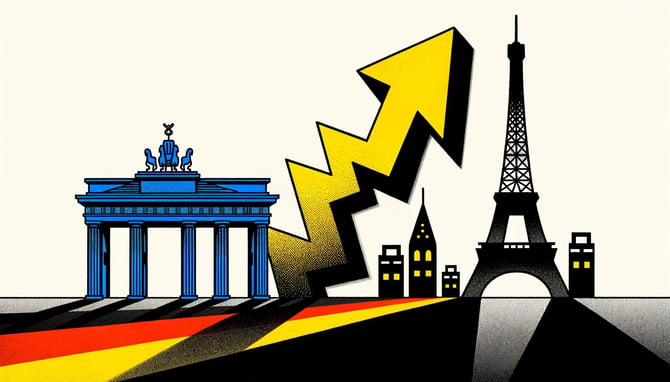French Bond Markets Remain Calm Amid Political Stalemate

Despite early selling, French government bond markets remained relatively stable on Monday following the second round of legislative elections. Initially, the 10-year French government bond yield increased by 3 basis points but soon settled at 3.221% by mid-morning in London.
This follows recent market jitters that saw the 10-year yield reach an eight-month high of over 3.3% after President Emmanuel Macron called a snap parliamentary election in mid-June.
The spread between French and German bond yields, which had reached 85 basis points recently, hit its highest level since 2012. However, as the election approached, the spread narrowed, widening to over 70 basis points on Monday before easing back to 67 basis points.
This relative market calm persists despite France's challenging fiscal situation, highlighted by the European Commission's announcement to place France under an Excessive Deficit Procedure (EDP) due to its budget deficit exceeding 3% of GDP.
What Does This Mean For Me?
The snap election's results showed the left-wing New Popular Front coalition unexpectedly winning the most parliamentary seats, though without an absolute majority. President Macron's Ensemble party came second, while the far-right National Rally (Rassemblement National), which led in the first round, finished third. The election outcome has stirred concerns over France's fiscal direction, with significant implications for its tax and spending policies.
The political uncertainty, particularly over appointing the new prime minister, continues to influence market sentiment. Despite avoiding a far-right victory, the left-wing alliance's economic policies remain a point of contention, with potential conflicts with Brussels still looming.
This follows recent market jitters that saw the 10-year yield reach an eight-month high of over 3.3% after President Emmanuel Macron called a snap parliamentary election in mid-June.
The spread between French and German bond yields, which had reached 85 basis points recently, hit its highest level since 2012. However, as the election approached, the spread narrowed, widening to over 70 basis points on Monday before easing back to 67 basis points.
This relative market calm persists despite France's challenging fiscal situation, highlighted by the European Commission's announcement to place France under an Excessive Deficit Procedure (EDP) due to its budget deficit exceeding 3% of GDP.
What Does This Mean For Me?
The snap election's results showed the left-wing New Popular Front coalition unexpectedly winning the most parliamentary seats, though without an absolute majority. President Macron's Ensemble party came second, while the far-right National Rally (Rassemblement National), which led in the first round, finished third. The election outcome has stirred concerns over France's fiscal direction, with significant implications for its tax and spending policies.
The political uncertainty, particularly over appointing the new prime minister, continues to influence market sentiment. Despite avoiding a far-right victory, the left-wing alliance's economic policies remain a point of contention, with potential conflicts with Brussels still looming.
More News
.webp)
Japan’s Rate Shift Is Rippling Through Global Bond Markets
1 week ago

China’s Growth Engine Stalls as Consumers and Investors Pull Back
1 week ago

Egypt’s Recovery Gains Traction as Household Pressure Lingers
2 weeks ago

OECD Warns AI and Tariffs Will Test the Global Economy
3 weeks ago

Zero Tariffs, Higher Drug Bills as US and UK Reset Pharma Trade
3 weeks ago

Catastrophe Bonds Go Global as Climate Risk Meets Yield Hunting
1 month ago
.webp)
Canada Shields Steel and Lumber Industries From Tariffs
1 month ago

Trump Drops Selected Tariffs in Response to Inflation Pressures
1 month ago